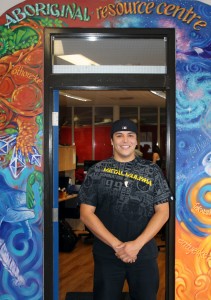By Tyson Leonard
 [1]
[1]Ronald Leaman is from the Magnetawan First Nations. He said he is offended when he sees people dressed up in cheap Pocahontas costumes with fake moccasins and headdresses. Leaman, a second year student in the custom border services program at Loyalist College, works in between classes in the college’s Aboriginal Resource Centre. Photo By Tyson Leonard.
Halloween is a holiday of fun and laughter for most, but for Aboriginals like Ronald Leaman it can be frightening for the wrong reasons.
Leaman, from the Magnetawan First Nations, said he is offended when he sees people dressed up in cheap Pocahontas costumes with fake moccasins and headdresses.
Leaman, a second year student in the custom border services program at Loyalist College, works in between classes in the college’s Aboriginal Resource Centre.
Leaman said not everyone who dresses as a culture is being offensive though. He said it’s an issue of respect.
“I do think it can be offensive for people that are portraying the culture wrong,” said Leaman.
“If they portray the culture in a half decent manner then it could be acceptable.”
If they’re doing it as an attempt to get to know more about the culture and to educate others, Leaman says it’s acceptable.
To Leaman this means more than just picking up a package costume from the store.
“The people that are just going and buying the Indian suit, I find that can be quite offensive,” said Leaman.
“To me it just seems like they’re making a mockery of it.”
Leaman said even if costume stores got rid of offensive costumes, people would still make them. As for stopping people from dressing in offensive costumes, He said people have to take responsibility themselves.
“Its kind of hard to say no to certain costumes because it is Halloween. It’s supposed to be fun, and you’re changing what you normally do to be something different. So to say that people cant wear a costume it seems a little bit authoritarian, but I guess there would have to be limits,” said Leaman.
Kelly Cooper, owner-operator at Costume Castle and Ballooniebin in Belleville, said she would never sell offensive costumes.
Cooper has been selling and renting Halloween costumes, and balloons for almost 15 years.
“The Klu Klux Klan would not be acceptable, or anything else racist,” said Cooper.
She said she doesn’t consider dressing as a culture for Halloween to be automatically offensive.
“Different cultures have their different fashions, and I have no problem with renting Mexican sombreros and ponchos, because that’s what they actually wear,” said Cooper.
Cooper also sells costumes meant to resemble Aboriginal and Chinese dress.
Cooper doesn’t see it as a race issue because people can dress up as a stereotypical German in lederhosen.
Halloween is all about having fun, just not at anyone’s expense, said Cooper.
“As long as you’re not making fun of somebody, and not putting down their culture or their traditions its fine,” said Cooper.
Dr. Pamela Palmater, the Chair in Indigenous Governance at Ryerson University, said cultural costumes are discriminatory no matter what the intent is.
“Discrimination has nothing to do with intentions, and has everything to do with the impact it has on the individual,” said Palmater.
Palmater works as a professor at Ryerson and has written several books on the First Nations and aboriginal identity. She was the runner up in the last Assembly of First Nations leadership elections.
“What people are doing when they dress as KKK or as slaves is showing a profound acceptance of the horrors that different cultures have gone through at the hands of European colonizers or settlers,” said Palmater.
The same goes for people who dress as stereotypical perceptions of indigenous people, said Palmater.
“Its more than just offensive, it actually promotes a negative attitude towards indigenous people, which is harmful,” said Palmater.
There are more than enough different costumes ideas to choose from that wont offend anyone, said Palmater.
Palmater said there is a big difference between dressing as an indigenous person or a slave, and dressing as a European culture. She said the historical context of genocide and slavery can’t be ignored.
It’s everyone’s responsibility to stop the practice of wearing offensive costumes, even storeowners, said Palmater.
“If you engage in a public activity you have to respect the rights, human rights, of all the people you serve,” said Palmater. “I think more and more as people raise these issues they will be addressed.”
One of the most widespread campaigns against offensive costumes is the “We’re a Culture not a Costume” poster campaign started by the Ohio University’s Students Teaching About Racism in Society. The campaign features 11 posters with people from different cultures showing examples of offensive costumes.